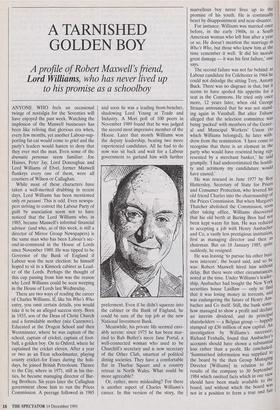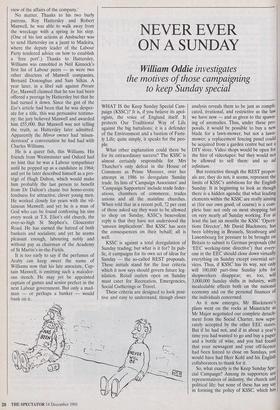A TARNISHED GOLDEN BOY
A profile of Robert Maxwell's friend,
Lord Williams, who has never lived up
to his promise as a schoolboy
ANYONE WHO feels an occasional twinge of nostalgia for the Seventies will have enjoyed the past week. Watching the implosion of the Maxwell businesses has been like reliving that glorious era when, every few months, yet another Labour-sup- porting fat-cat would come to grief and the party's leaders would hasten to deny that they ever met the man. Even some of the dramatis personae seem familiar: Joe Haines, Peter Jay, Lord Donoughue and Lord Williams of Elvel, former Maxwell flunkeys every one of them, were all courtiers of Wilson or Callaghan.
While most of these characters have taken a well-merited drubbing in recent days, Lord Williams has been mentioned only en passant. This is odd. Even newspa- pers striving to convict the Labour Party of guilt by association seem not to have noticed that the Lord Williams who, in 1985, became Maxwell's informal financial advisor (and who, as of this week, is still a director of Mirror Group Newspapers) is the same man who has been Labour's sec- ond-in-command in the House of Lords since November 1989. He was tipped to be Governor of the Bank of England if Labour won the next election: he himself hoped to sit in a Kinnock cabinet as Lead- er of the Lords. Perhaps the thought of this cup passing from him was the reason why Lord Williams could be seen weeping in the House of Lords last Wednesday.
There are two ways of reading the career of Charles Williams. If, like his Who's Who entry, you omit certain details, you would take it to be an alleged success story. Born in 1933, son of the Dean of Christ Church and a formidable mother (née Cazenove). Educated at the Dragon School and then Westminster, where he was captain of the school, captain of cricket, captain of foot- ball, a golden boy. On to Oxford, where he captained the cricket eleven. After a year or two as an Eton schoolmaster, playing county cricket-for Essex during the holi- days, he joined British Petroleum. Thence to the City, where in 1971, still in his thir- ties, he became managing director of Bar- ing Brothers. Six years later the Callaghan government chose him to run the Prices Commission. A peerage followed in 1985
and soon he was a leading front-bencher, shadowing Lord Young at Trade and Industry. A Mori poll of 100 peers in November 1989 found that he was judged the second most impressive member of the House. Later that month Williams won the deputy leadership, beating two more experienced candidates. All he had to do now was sit back and wait for a Labour government to garland him with further preferment. Even if he didn't squeeze into the cabinet or the Bank of England, he could be sure of the top job at the new National Investment Bank.
Meanwhile, his private life seemed envi- ably serene: since 1975 he has been mar- ried to Rab Butler's niece Jane Portal, a well-connected woman who used to be Churchill's secretary and is now secretary of the Other Club, smartest of political dining societies. They have a comfortable flat in Thurloe Square and a country retreat in North Wales. What could be more agreeable?
Or, rather, more misleading? For there is another aspect of Charles Williams's career. In this version of the story, the marvellous boy never lives up to the promise of his youth. He is continually beset by disappointment and near-disaster.
For instance: Williams was married once before, in the early 1960s, to a South American woman who left him after a year or so. He doesn't mention the marriage in Who's Who, but those who knew him at the time remember it well. 'It did his morale great damage — it was his first failure,' one says.
The second failure was not far behind: as Labour candidate for Colchester in 1964 he could not dislodge the sitting Tory, Antony Buck. There was no disgrace in that, but it seems to have spoiled his appetite for a seat in the Commons. He tried only once more, 12 years later, when old George Strauss announced that he was not stand- ing again in Vauxhall. But after Tribune alleged that the selection committee was being 'packed' with members of the Gener- al and Municipal Workers' Union (to which Williams belonged), he later with- drew from the nomination. 'I have come to recognise that there is an element in the party who would have resented being rep- resented by a merchant banker,' he said grumpily. 'I had underestimated the hostili- ty and acrimony my candidature would have caused.'
He was rescued in June 1977 by Roy Hattersley, Secretary of State for Prices and Consumer Protection, who levered his old friend Charles into the chairmanship of the Prices Commission. But when Margaret Thatcher abolished the Commission, soon after taking office, Williams discovered that his old berth at Baring Bros had not been kept warm for him. He was reduced to accepting a job with Henry Ansbacher and Co, a vastly less prestigious institution, first as managing director and then .as chairman. But on 18 January 1985, crate suddenly, he resigned. He was leaving 'to pursue his other busi- ness interests', the board said, and so he was: Robert Maxwell hired him without delay. But there were other circumstances, noted at the time. Under Williams's leader- ship, Ansbacher had bought the New York securities house Laidlaw — only to find that it was losing money in torrents, and was endangering the future of Henry Ans- bacher and Co itself. Still, the bank some- how managed to show a profit and declare an interim dividend, and its principal shareholders — a Belgian group — hapOY stumped up £36 million of new capital. An investigation by Williams's successor, Richard Fenhalls, found that Ansbacher 's accounts should have shown a substantial loss rather than a profit. He concluded. `Summarised information was supplied to the board by the then Group Managing Director [Williams] in relation to the results of the company to 30 September 1984 which omitted facts which in our view should have been made available to the board, and without which the board Was not in a position to form a true and fair
view of the affairs of the company.'
No matter. Thanks to his two burly patrons, Roy Hattersley and Robert Maxwell, he was able to walk away from the wreckage with a spring in his step. (One of his last actions at Ansbacher was to send Hattersley on a jaunt to Madeira, where the deputy leader of the Labour Party tendered advice on how to establish a 'free port'.) Thanks to Hattersley, Williams was ennobled in Neil Kinnock's first list of Labour peers — as were two other directors of Maxwell companies, Bernard Donoughue and Sam Silkin. A year later, in a libel suit against Private Eye, Maxwell claimed that he too had been offered a peerage by Hattersley but that he had turned it down. Since the gist of the Eye's article had been that he was desper- ate for a title, this was persuasive testimo- ny: the jury believed Maxwell and awarded him £55,000. But Maxwell was not telling the truth, as Hattersley later admitted. Apparently the Mirror owner had 'misun- derstood' a conversation he had had with Charles Williams.
He is a queer fish, this Williams. His friends from Westminster and Oxford had no hint that he was a Labour sympathiser until he popped up as a candidate in 1964; and yet he later described himself as a pro- tégé of Hugh Dalton, which would make him probably the last person to benefit from Dr Dalton's chaste but homo-erotic fondness for attractive, clever young men. He worked closely for years with the vil- lainous Maxwell; and yet he is a man of God who can be found confessing his sins every week at T.S. Eliot's old church, the ever-so-high St Stephen's, Gloucester Road. He has earned the hatred of both bankers and socialists; and yet he seems pleasant enough, labouring nobly and without pay as chairman of the Academy of St Martin's-in-the-Fields.
It is too early to say if the perfumes of Araby can keep sweet the name of Williams now that his late associate, Cap- tain Maxwell, is emitting such a malodor- ous stench. He may yet be appointed captain of games and senior prefect in the next Labour government. But only a mad- man — or perhaps a banker — would bank on it.



































































 Previous page
Previous page